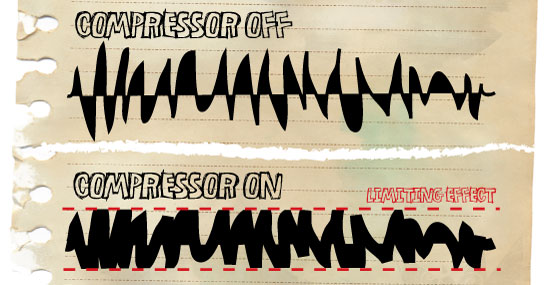Very few effects are more polarizing than the compressor pedal. I have some friends who believe that a compressor pedal is an inexpensive and very effective way to ruin a good guitar tone. I have met other people who consider the compressor an integral part of their sound and will never turn it off. I sit somewhere in the middle. I believe that a compressor is one of those pedals that has a good deal of power, and therefore must be used for good and not for evil. Keep in mind that everything in this world has a feature set. Compressors are no different and therefore do have something to offer guitar players. But without moderation, a compressor can lead you to a world of seedy motels, back room drug deals, and a loss of your civil rights. OK, a compressor can’t really do that to you, but it CAN rob your guitar tone of expressive and musical dynamic changes.
A compressor acts as a dual purpose pedal in that it works to limit the volume peaks of louder guitar passages and it also boosts the volume “valleys” of quieter guitar passages. As a hired gun/ sideman, I almost always use a compressor because I believe that it offers some reliability to the guy or girl running front of house (FOH) sound. I want my guitar parts to sound as if they’re studio quality and in a controlled environment. I have known more than one sound person who mixes by subtraction, which means as soon as somebody on stage gets too loud, they reach over and adjust that fader downward. This would be fine if they eventually bumped the fader back up, but with so much going on, they’ve often moved on to the next task and that fader gets left alone for the rest of the show. A compressor allows me to maintain a constant volume output, regardless of whether my tones are clean, dirty, delayed, dry, or dripping with the wetness of every effect on my pedalboard. As a byproduct of that limiting effect, your clean guitar lines can sound nice and snappy and spanky when you add a touch of compression. Funk rhythms sound much more tight and clean lines have a nice blossom in their attack.
In addition to limiting the volume peaks of louder guitar passages, a compressor also boosts quieter guitar parts. This can be beneficial when you have a light touch that is almost too light and you still want the nuances of what you’re playing on a live stage to translate through the house PA and to the audience. Compressors, when set in moderation, also act as a thickening agent. When using subtle compression, I always feel like my guitar tone has just a little more oomph and pow both of which are highly technical terms. One additional benefit of the boosting effect of compression is it’s ability to add sustain. If the pedal is making quieter passages louder, then it stands to reason that as your notes start to decay/fade, the compressor boosts their volume so that they last longer. In the 80’s, it was common for guitar players to add a compressor/boost during solos to add sustain to their lines.
I’m a bit of a compressor junkie, so I’ve been through a bunch of them. I have tried many of the boutique and esoteric compressors and I’ve tried some of the more readily available (and cost effective) ones too. I’ve even built and modded 3 or 4 from the ground up. While each one offers some unique charm (like I said, everything in this world has a feature set), I am partial to one named the RAF Mirage that I discovered while gigging in North Carolina. For a couple of years I used a BOSS CS-3 that I modded with the Monte Allums modification and I especially liked the fact that you could set it to get a Nashville-style brickwall squash (more common in 2000 than in 2010) or you could set it for a subtle fattening with a touch of extra sparkle on top via the tone knob. Recently, I received an MXR Custom Comp (which seems to share some of the circuitry magic of the much loved and very hard to find Way Huge Saffron Squeeze) that I’ll be testing out at gigs for the next season so I can do a write up here at The Tone Chef.com. At any rate, I would say that a compressor is probably my desert island effect. If I was marooned on a deserted island with just a guitar and an amp and I was allowed to bring one stompbox, it would be a trusty compressor, namely because it lets me get the same kind of response that I’d get from an amp turned all the way up, without the distortion and overall volume.
As is always the case with effects and tones, test them out for yourself and see what your ears want to eat.




Comments on this entry are closed.
What is your thought on the Barber Tone Press? Seems like a happy medium with being able to blend in the clean tone.
I think the BTP is a cool pedal. I definitely like the idea that you can mix in some of the clean signal just to manage how much squish and squash you get from the stompbox. I have a few friends who swear by all of the Barber pedals. I don’t have much experience with the various drives, but word on the street is that they’re good stuff.
I use a Tone Press, I love it. The blend knob is the most awesome thing ever added to a compressor.
I like the Tone Press too. You can dial in the amount of compression vs pure signal to the point that you lose almost no dynamics. It is simple to use, Level, Blend and Sustain. So it is kind of like a Dyna Comp or Keeley Two Knob, with the added “Blend” feature. Plus it is WHISPER quiet! My only gripe is the box is big. I wish Barber made pedals with a smaller footprint.
Great stuff. I have been following you on youtube, gear page and now this. I am 49 and this is the first time I have posted on a BLOG!!! You pulled me into the 21st century!!! Question. I have the Line 6 M9 and am wondering what a good “get started in the compressor world” model would be and what settings. I play a Gibson Les Paul with a SD JB in the bridge and a 59 in the neck. Just looking for a good “set it and leave it on all the time” setting for clean and overdriven sounds Once I get my feet wet a little I will branch out into other models/settings. Playing mostly at church with an occasional other blues/rock gig. Thanks a bunch!
Hi Paul,
Glad I could help! 🙂 Well, on your compressor question for an “always on” comp, there are a couple of options. I would stay away from the Red Comp and the Blue Comp. Those are models of the DynaComp and the BOSS CS2/CS3 and both are gonna have too much squish. Since you’re starting with a Les Paul, you’re starting with a guitar that already has some natural squish to it. I would go with the Boost Comp. What’s cool about that one is you can turn the Drive setting way down to about 10% and then bring the Comp setting up to 50-60% and it’s a nice subtle compression. Be mindful of how the Drive and the Output settings work off of one another. I would recommend lower Drive and higher Output so that you’re basically at unity gain with the Boost Comp on or off. I also add a pinch of extra top end for some extra compressor sparkle.
Good luck!
Well, I see that I am commenting about 2 years after this article was posted, but hopefully the boss of the kitchen is still checking the comments, because I have a question haha. I really love Phish, and I know Trey uses a Ross compressor, but the real deals of those are tough to find and expensive. What are some good clones of the Ross in your opinion? Also, do you know of any good places to look for a saffron squeeze? I’ve heard that’s great as well but also tough to find
Hi Micah,
Sorry for the delay in responding. The Ross is a great compressor and there are a handful of companies that claim to be making the Ross clone. For starters, the Visual Sound Route 66 is 2 fx in one and it’s a tubescreamer on one side and a Ross clone on the other. Also, Analogman used to make a Bi-Comp which was a Ross on one side and a Dan Armstrong Orange Squeezer on the other. I think if you google “grey compressor” then you might find some more clones. As I understand it, the Ross comp was in an unassuming grey enclosure.
On the Saffron Squeeze. Now you’re talking!! The old Way Huge stuff is great, but crazy expensive to find originals. I’ve seen Original Red Llamas and Saffron Squeezes go for more than $1k on ebay. Same as the Ross, I’d try googling “Saffron Squeeze clone” and see if anybody is making one. The good news for you is that MXR/DUNLOP has purchased the Way Huge name and Jorge Tripps actually is their lead designer now. They’ve done a great job of reissuing some of the great WH pedals of old and it may not be long before we see a Saffron Squeeze mkII.